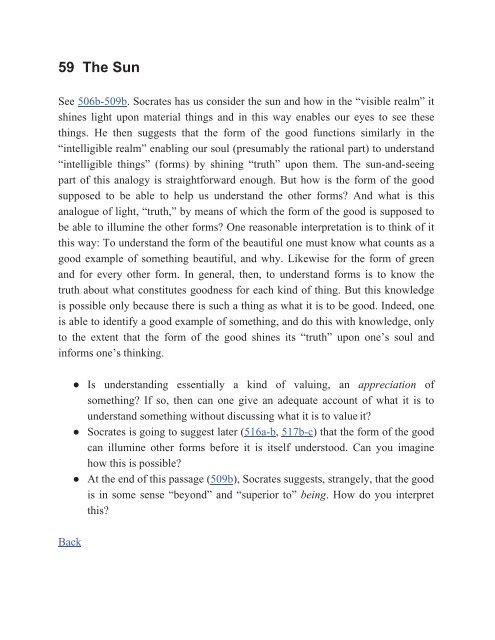The Intelligent Troglodyte’s Guide to Plato’s Republic, 2016a
The Intelligent Troglodyte’s Guide to Plato’s Republic, 2016a
The Intelligent Troglodyte’s Guide to Plato’s Republic, 2016a
Create successful ePaper yourself
Turn your PDF publications into a flip-book with our unique Google optimized e-Paper software.
59 <strong>The</strong> Sun<br />
See 506b-509b. Socrates has us consider the sun and how in the “visible realm” it<br />
shines light upon material things and in this way enables our eyes <strong>to</strong> see these<br />
things. He then suggests that the form of the good functions similarly in the<br />
“intelligible realm” enabling our soul (presumably the rational part) <strong>to</strong> understand<br />
“intelligible things” (forms) by shining “truth” upon them. <strong>The</strong> sun-and-seeing<br />
part of this analogy is straightforward enough. But how is the form of the good<br />
supposed <strong>to</strong> be able <strong>to</strong> help us understand the other forms? And what is this<br />
analogue of light, “truth,” by means of which the form of the good is supposed <strong>to</strong><br />
be able <strong>to</strong> illumine the other forms? One reasonable interpretation is <strong>to</strong> think of it<br />
this way: To understand the form of the beautiful one must know what counts as a<br />
good example of something beautiful, and why. Likewise for the form of green<br />
and for every other form. In general, then, <strong>to</strong> understand forms is <strong>to</strong> know the<br />
truth about what constitutes goodness for each kind of thing. But this knowledge<br />
is possible only because there is such a thing as what it is <strong>to</strong> be good. Indeed, one<br />
is able <strong>to</strong> identify a good example of something, and do this with knowledge, only<br />
<strong>to</strong> the extent that the form of the good shines its “truth” upon one’s soul and<br />
informs one’s thinking.<br />
Is understanding essentially a kind of valuing, an appreciation of<br />
something? If so, then can one give an adequate account of what it is <strong>to</strong><br />
understand something without discussing what it is <strong>to</strong> value it?<br />
Socrates is going <strong>to</strong> suggest later (516a-b, 517b-c) that the form of the good<br />
can illumine other forms before it is itself unders<strong>to</strong>od. Can you imagine<br />
how this is possible?<br />
At the end of this passage (509b), Socrates suggests, strangely, that the good<br />
is in some sense “beyond” and “superior <strong>to</strong>” being. How do you interpret<br />
this?<br />
Back


















